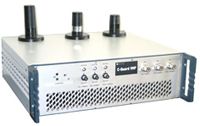Inside Cell Phone Jammers
Electronically speaking, cell-phone jammers are very basic devices. The simplest just have an on/off switch and a light that indicates it's on. More complex devices have switches to activate jamming at different frequencies. Components of a jammer include:
Antenna
Every jamming device has an antenna to send the signal. Some are contained within an electrical cabinet. On stronger devices, antennas are external to provide longer range and may be tuned for individual frequencies.
Advertisement
Circuitry
The main electronic components of a jammer are:
- Voltage-controlled oscillator - Generates the radio signal that will interfere with the cell phone signal
- Tuning circuit - Controls the frequency at which the jammer broadcasts its signal by sending a particular voltage to the oscillator
- Noise generator - Produces random electronic output in a specified frequency range to jam the cell-phone network signal (part of the tuning circuit)
- RF amplification (gain stage) - Boosts the power of the radio frequency output to high enough levels to jam a signal
Power supply
Smaller jamming devices are battery operated. Some look like cell phone and use cell-phone batteries. Stronger devices can be plugged into a standard outlet or wired into a vehicle's electrical system.
- Check your phone - If the battery on your phone is okay, and you'd like to continue your conversation, try walking away from the area. You may be able to get out of the jammer's range with just a few steps.
